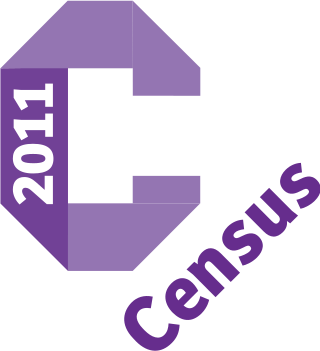Related Research Articles
Plaid Cymru is a centre-left to left-wing, Welsh nationalist political party in Wales, committed to Welsh independence from the United Kingdom.
The local government areas of Scotland were redefined by the Local Government (Scotland) Act 1973 and redefined again by the Local Government etc (Scotland) Act 1994.
The Other Backward Class (OBC) is a collective term used by the Government of India to classify castes which are educationally or socially backward. It is one of several official classifications of the population of India, along with general castes, Scheduled Castes and Scheduled Tribes (SCs and STs). The OBCs were found to comprise 52% of the country's population by the Mandal Commission report of 1980, and were determined to be 41% in 2006 when the National Sample Survey Organisation took place. There is substantial debate over the exact number of OBCs in India; it is generally estimated to be sizable, but many believe that it is higher than the figures quoted by either the Mandal Commission or the National Sample Survey.

As a result of the Fifth Periodical Review of the Boundary Commission for Scotland, Scotland is covered by 59 constituencies of the House of Commons of the United Kingdom Parliament: 19 burgh constituencies and 40 county constituencies. These constituencies were used from the 2005 to the 2019 general elections, and will be replaced by new constituencies at the next election.
The Royal Commission into the Building and Construction Industry, or informally the Cole Royal Commission, was a Royal Commission established by the Australian government to inquire into and report upon alleged misconduct in the building and construction industry in Australia. The establishment of the Commission followed various unsuccessful attempts by the Federal Government to impose greater regulation upon the conduct of industrial relations in that industry.

English votes for English laws (EVEL) was a set of procedures of the House of Commons of the Parliament of the United Kingdom whereby legislation that affected only England required the support of a majority of MPs representing English constituencies. The procedures were in place between 2015 and 2021. They were developed following devolution in the United Kingdom as a result of the West Lothian question, a concern about the perceived inequity of MPs from Northern Ireland, Scotland and Wales, sitting in the House of Commons being able to vote on matters that affected only England, while MPs from England were unable to vote on matters that had been devolved to the Northern Ireland Assembly, the Scottish Parliament and the Senedd.
Pay Commission is set up by Government of India, and gives its recommendations regarding changes in salary structure of its employees set up in 1947, Since India's Independence, seven pay commissions have been set up on a regular basis to review and make recommendations on the work and pay structure of all civil and military divisions of the Government of India. Headquartered in Delhi (India), the commission is given 18 months from date of its constitution to make its recommendations.

Richard William Marsh, Baron Marsh, was a British politician and business executive.
Minimum wage law is the body of law which prohibits employers from hiring employees or workers for less than a given hourly, daily or monthly minimum wage. More than 90% of all countries have some kind of minimum wage legislation.

The judiciary of India is a system of courts that interpret and apply the law in the Republic of India. India uses a common law system, first introduced by the British East India Company and with influence from other colonial powers and Indian princely states, as well as practices from ancient and medieval times. The constitution provides for a single unified judiciary in India.

Laura Juliet Kuenssberg is a British journalist who presents the BBC's flagship Sunday morning politics show.
The Lokayukta is the Indian Parliamentary Ombudsman, executed into power, through and for, each of the State Governments of India. It is brought into effect in a state, after passing the Lokayukta Act in respective state Legislature and a person of reputable background is nominated to the post. The post is created to quickly address grievances against the working integrity and efficiency of the government or its administration. Once appointed, Lokayukta cannot be dismissed or transferred by the government, and can only be removed by passing an impeachment motion by the state assembly, making it a powerful deterrent against corruption and mal-administration of the governing system.
The Administrative Reforms Commission (ARC) is the commission appointed by the Government of India for giving recommendations for reviewing the public administration system of India. The first ARC was established on 5 January 1966. The Administrative Reforms Commission was initially chaired by Morarji Desai, and later on K. Hanumanthaiah became its chairman when Desai became the Deputy Prime Minister of India.
The Law Commission of India is an executive body established by an order of the Government of India. The commission's function is to research and advise the government on legal reform, and is composed of legal experts, and headed by a retired judge. The commission is established for a fixed tenure and works as an advisory body to the Ministry of Law and Justice.

A census of the population of the United Kingdom is taken every ten years. The 2011 census was held in all counties of the UK on 27 March 2011. It was the first UK census which could be completed online via the Internet. The Office for National Statistics (ONS) is responsible for the census in England and Wales, the General Register Office for Scotland (GROS) is responsible for the census in Scotland, and the Northern Ireland Statistics and Research Agency (NISRA) is responsible for the census in Northern Ireland.
From the 1991 India economic crisis to its status of third largest economy in the world by 2011, India has grown significantly in terms of economic development, so has its banking sector. During this period, recognizing the evolving needs of the sector, the Finance Ministry of the Government of India set up various committees with the task of analyzing India's banking sector and recommending legislation and regulations to make it more effective, competitive and efficient.

In the United Kingdom, devolution is the Parliament of the United Kingdom's statutory granting of a greater level of self-government to the Scottish Parliament, the Senedd, the Northern Ireland Assembly and the London Assembly and to their associated executive bodies the Scottish Government, the Welsh Government, the Northern Ireland Executive and in England, the Greater London Authority and combined authorities.
The Truth and Justice Commission of Mauritius was an independent truth commission established in 2009, which explored the impact of slavery and indentured servitude in Mauritius. The Commission was tasked to investigate the dispossession of land, and “determine appropriate measures to be extended to descendants of slaves and indentured laborers.” It was “unique in that it [dealt] with socio-economic class abuses" and explored the possibility of reparations. The inclusion of reparations, whether for individuals or communities, was a controversial decision within the country which aimed to correct inequality. The Commission attempted to cover more than 370 years, the longest period of time that a truth commission has ever covered.
Khumbudzo Phophi Silence Ntshavheni is a South African politician who is currently serving as Minister in the Presidency since March 2023. She was formerly the Minister of Communications and Digital Technologies from 2021 to 2023 and the Minister of Small Business Development from 2019 to 2021. She is a member of the African National Congress (ANC).
References
- ↑ "Focus". pib.nic.in. 24 December 1966. Retrieved 25 July 2013.[ dead link ]
- ↑ "Proposal to allow contract labour in selected industries under study". The Hindu . 7 December 2003. Archived from the original on 28 March 2004. Retrieved 25 July 2013.
- ↑ "National Commission on Labour – Recommendations". Cbwe.gov.in. Retrieved 25 July 2013.[ dead link ]
- ↑ "REPORT OF THE NATIONAL COMMISSION ON LABOUR" (PDF). Prsindia.org. Retrieved 23 January 2019.[ dead link ]
- ↑ "Loaded against labour". Frontline.thehindu.com. Retrieved 23 January 2019.[ dead link ]